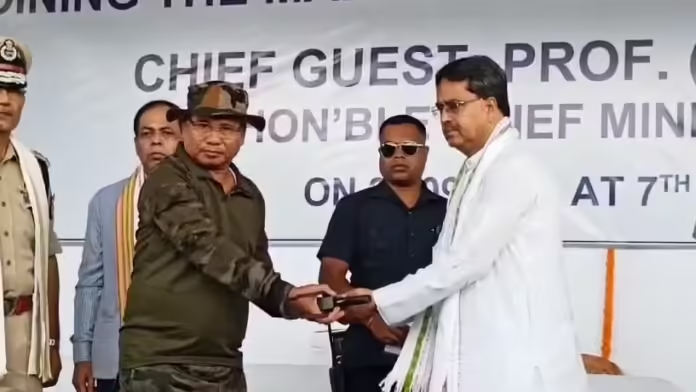Tripura Chief Minister Biplab Kumar Deb announced on Tuesday that Tripura is now free from insurgency. His statement came after 584 cadres of the National Liberation Front of Tripura (NLFT) and the All Tripura Tiger Force (ATTF) laid down their arms following a peace accord signed between the Government of India, the Government of Tripura, and the two insurgency outfits. The event marked a historic moment for the northeastern state, which had long been plagued by violence and unrest.
The Chief Minister emphasized that this surrender of weapons is not just a symbolic gesture but a significant step towards lasting peace in Tripura. The state had been battling insurgency for decades, with armed groups like NLFT and ATTF fighting for separate tribal homelands. The peace accord signed earlier this year laid the foundation for dialogue, with both groups agreeing to come to the table to discuss their grievances and aspirations within the framework of India’s Constitution.
The 584 cadres handed over their arms to authorities in a formal ceremony, attended by senior officials from the central and state governments. The event took place amid tight security but was marked by a sense of relief and optimism. The Chief Minister praised the efforts of both state and central forces in maintaining law and order and creating an environment conducive to peace talks.
Deb highlighted the role of the peace accord, which promises to provide economic rehabilitation, employment, and political empowerment for the surrendered militants. “The Government of Tripura is committed to providing them with opportunities to reintegrate into society and contribute to the development of the state,” Deb said. He also mentioned that several cadres had already been given vocational training, and efforts were underway to ensure their smooth transition to civilian life.
The insurgency in Tripura was rooted in ethnic and political tensions, particularly between tribal communities and non-tribal settlers. For years, NLFT and ATTF operated from remote areas, launching attacks on security forces and civilians. These groups sought autonomy for Tripura’s indigenous population, citing historical injustices and loss of land and resources. However, over the years, the strength of these insurgent groups had weakened significantly, thanks to counter-insurgency operations and dwindling local support.
The peace accord is seen as a result of sustained efforts by the Government of India to bring development to the northeast, focusing on infrastructure, education, and employment. The signing of the accord is a significant achievement in the region’s political landscape, where insurgent movements once thrived due to underdevelopment and neglect. The successful conclusion of talks and the subsequent surrender of arms are being hailed as proof of the government’s commitment to bringing peace to the region.
While the surrender of 584 cadres marks a major step forward, the Chief Minister acknowledged that the real challenge lies in ensuring that peace is maintained. “The road ahead will require continuous dialogue and cooperation between all stakeholders,” he said, urging the people of Tripura to support the government’s efforts in ensuring stability and development.
The central government’s focus on northeast India has intensified in recent years, with several initiatives aimed at improving connectivity, infrastructure, and economic growth in the region. Prime Minister Narendra Modi has repeatedly emphasized the need for peace as a prerequisite for development, and Tripura’s newfound peace is seen as a significant victory in this broader strategy.
The peace accord has also sparked conversations about the future of Tripura’s political landscape. With the insurgent groups laying down their arms and joining the mainstream, many expect shifts in the region’s political dynamics. The government has promised political representation for tribal communities, which could lead to greater political inclusion for the once-marginalized groups.
The successful surrender of insurgents is expected to have a ripple effect across the northeast, where other insurgent groups are still active. The Tripura government is optimistic that the surrender will serve as a model for resolving similar conflicts in other states. By prioritizing dialogue, development, and rehabilitation, Tripura is moving toward a future free of violence and instability.
As Tripura moves forward, the focus will shift to ensuring that the promises made in the peace accord are fulfilled, and that the former insurgents can find a place in the state’s peaceful and productive future.




